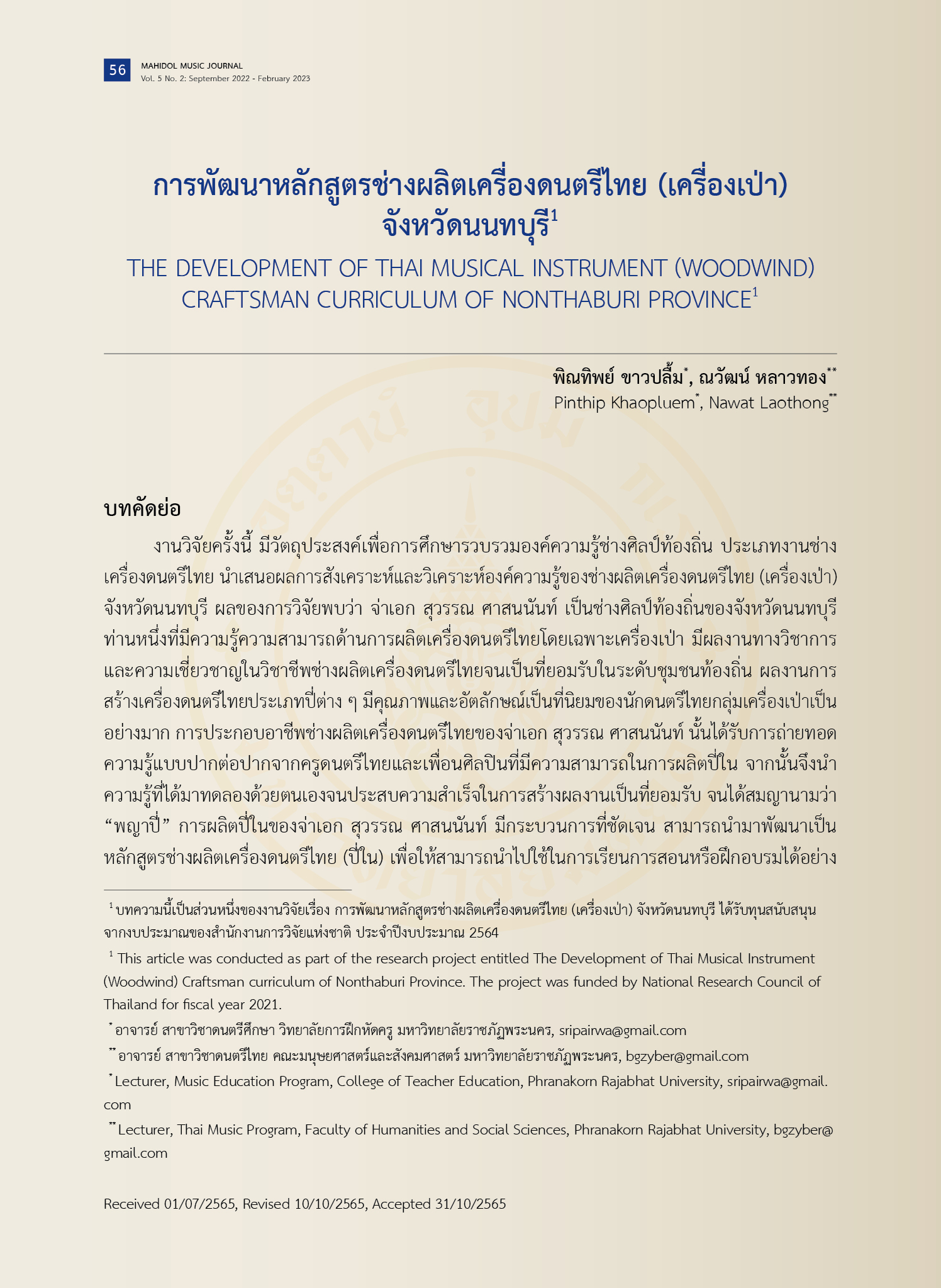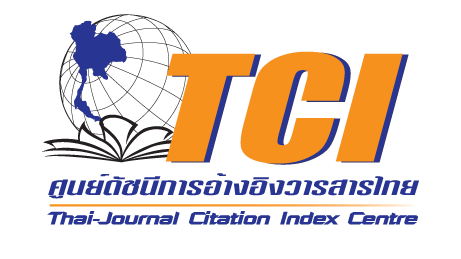THE DEVELOPMENT OF THAI MUSICAL INSTRUMENT (WOODWIND) CRAFTSMAN CURRICULUM OF NONTHABURI PROVINCE
Keywords:
Curriculum Development, Thai Musical Instrument Craftsman, Pi Nai (Thai Oboe), Phaya Pi, TASSHAAbstract
This research aims to study and compile knowledge of local Thai musical instrument craftsman, present synthesis and analysis of knowledge of Thai flute instrument craftsmen in Nonthaburi. The result of this research found that the Master Sergeant Suwan Sassananun, the former Thai Army musician, is one of Nonthaburi's local craftsmen, who has great knowledge and ability to make Thai musical instrument especially, woodwind. He is well recognized in the community and has academic theses and professional expertise in the field of Thai musical instruments. His Thai Flute instrument invention is of the best quality and uniqueness, which has been famous and being admired by Thai Flute players. His occupation in the traditional Thai instrument was acquired through the oral literature from many Thai traditional musical masters and from his friends who are skilled in Pi Nai crafting, Later on, he successfully applied the knowledge on his own trial. He has been known as “Phaya Pi”. His Pi Nai invention process is clear and can be develop as the Thai Musical Instrument (Pi Nai) Craftsman Course for an effective teaching or training. The development of this study is initiated from the constructive thinking on the study that is to present the value of Thai traditional musical instrument and Thai musical instrument craftsman. The objective of the study is to emphasize on the practicable and achievable in crafting the Thai traditional musical instrument. The set and the study descriptions that was resulted from the study of Master Sergeant Suwan Sassananun’s expertise, had been established both in Theoretical part and Practical part. Training activity, training material, evaluation, and assessment all resulted in the greatest level of satisfaction ( = 4.5). The developed course includes course preparation mindset, course purpose, course structure and contents, training activity, course training material, course measurement and evaluation. The course should have process of knowledge transfer from research to community with 5 elements of system approach which consists of input, process, output, control, and feedback. The result of course experiment found that the participants be able to make Pi Nai according to the purpose of Training. Moreover, some of participants can disseminate the knowledge effectively.
References
ประเสริฐ แย้มกลิ่นฟุ้ง. สังคมชนบทไทย. กรุงเทพฯ : สำนักพิมพ์จุฬาลงกรณ์, 2536.
วิชัย วงษ์ใหญ่. การพัฒนาหลักสูตรระดับอุดมศึกษา. กรุงเทพฯ : อาร์ แอนด์ ปริ้น, 2554.
สำนักงานปลัดกระทรวงการอุดมศึกษา วิทยาศาสตร์ วิจัยและนวัตกรรม. “เหตุการณ์เล่าเรื่อง : วิทยสถานด้านสังคมศาสตร์ มนุษยศาสตร์ และศิลปกรรมศาสตร์แห่งประเทศไทย.” อนุสารอุดมศึกษา ปีที่ 47, ฉบับที่ 513 (มีนาคม 2564) : 12-14.
คณะกรรมการวัฒนธรรมแห่งชาติ. การใช้และการพัฒนากระบวนการถ่ายทอดวัฒนธรรมท้องถิ่น. กรุงเทพฯ : โรงพิมพ์คุรุสภา, 2537.
อนงค์ จิตรมณี. กรรมวิธีการสร้างปี่ใน. วิทยานิพนธ์ระดับปริญญามหาบัณฑิต. จุฬาลงกรณ์มหาวิทยาลัย, 2543. https://tdc.thailis.or.th/tdc/.

Downloads
Published
How to Cite
Issue
Section
License
Copyright (c) 2023 College of Music

This work is licensed under a Creative Commons Attribution-NonCommercial-NoDerivatives 4.0 International License.
The copyright of the article belongs to the author. Published articles represent the views of the authors. The editorial team neither necessarily agree with nor take any responsibility for the article.





